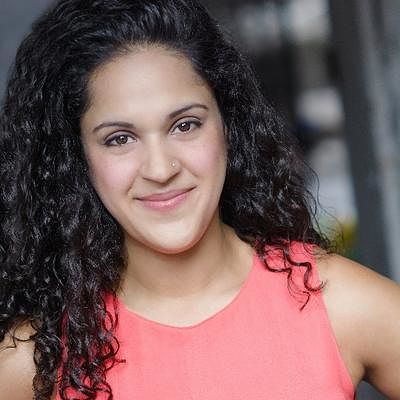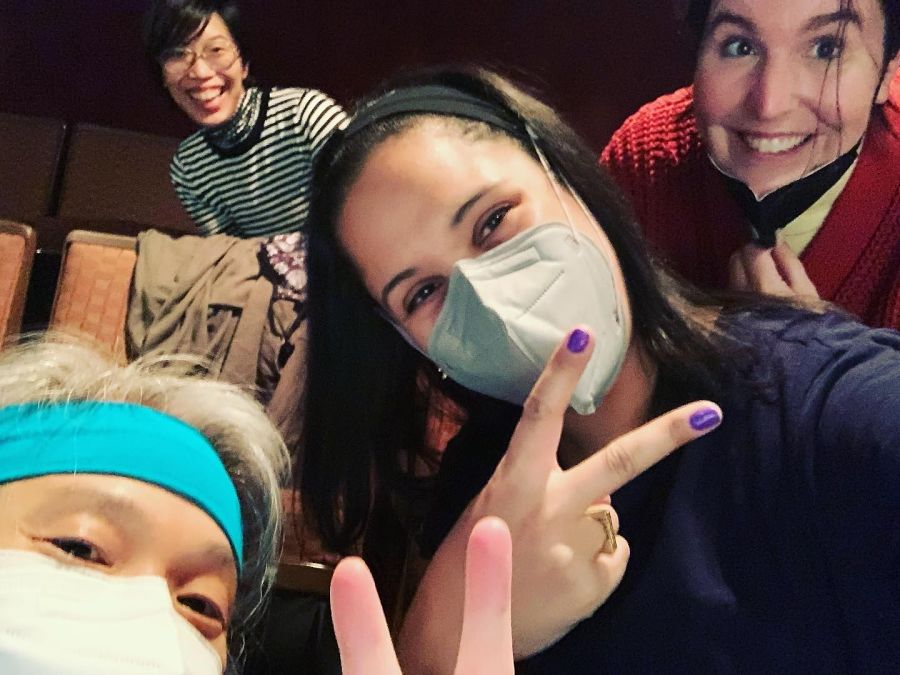If there were an award for the hardest-working stage director in America, Melissa Crespo (she/her) would certainly make the short list of nominations.
Take a glance at her résumé and you’ll see a handful of fellowships from D.C. to NYC, a stint as a production coordinator at the Kennedy Center, an MFA from the New School, and a decade of freelance directing credits at theatres across the country. But that crowded CV isn’t all in the past: Crespo has continued to freelance since she took her most recent role as associate artistic director at Syracuse Stage, a job she took while in the midst of the Still Standing Artist Residency with Stonehenge NYC, which granted her an apartment, free of charge for one year, in exchange for commissioned work.

Non-stop drive seems to be in Crespo’s DNA. Describing herself as a child, Crespo recalled being “outgoing, very energetic.” Her parents put her into theatre programs as a way to channel that energy into something productive and creative. It stuck, and before long Crespo found herself at Shenandoah Shakespeare (now the American Shakespeare Center), first as a student and eventually as a counselor. It was there that Crespo discovered directing in a kind of flash.
“I directed this showcase of scenes from Shakespeare’s plays, and the theme was sleep,” Crespo said. “I had never directed anything before, and it was one of those lightbulb moments—like Oprah calls it an ‘aha moment.’ I had a bunch of these kids sleeping all over the theatre, and they would wake up and do a monologue or a song. I was 19, and I was crying. And I was like: This is awesome.”
From there Crespo began studying at Ithaca College, before transferring to the University of Virginia, where she pursued a double major in drama and English. It was at UVA that Crespo was encouraged by mentors like Betsy Tucker to lean into directing, and where she was first given the chance to choose material that reflected the kind of work she wanted to bring to the stage.
Crespo recalled an incident during her time at UVA where a Black student was attacked and was called a racial slur. She remembers the student population being “up in arms and really upset.” As a response, Crespo decided to stage George C. Wolfe’s The Colored Museum. She credits that process as the first time she felt she had real agency within her work.
“There was an awakening in myself,” Crespo said. “I thought: Oh, I have a voice and I can use that voice to say whatever I want as a director. There’s just a lot of power and responsibility you have as a director. That was very, very exciting.”
Crespo brings that sense of power and responsibility into all of her work, most recently Yoga Play by Dipika Guha, which opened at Syracuse Stage on Jan. 19 and runs through Feb. 6 (it will also available to stream Jan. 31-Feb. 20, and will play at co-producing company Geva Theatre Center in Rochester, N.Y. in May). The play is just the kind of show Crespo gravitates toward: It balances a hearty sense of humor with weighty, topical themes.
In Yoga Play, the new CEO of the fictional athletic apparel brand Jojomon scrambles to save the business after her predecessor is ousted for making fat-shaming comments in public. Guha’s script interrogates authenticity as it relates to both racial identity and cultural appropriation, as the company is forced to grapple with the conflicting values of wealth and wellness. (The parallels to Lululemon and the controversies surrounding its practices are very much intentional.)
Syracuse Stage artistic director Robert Hupp (he/him), who was originally set to direct Yoga Play before it was delayed, hailed the fresh visual language that Crespo brings to her work, employing a cohort of designers she’s worked with before but are new to the company, and a directing style that is both collaborative and exacting.
“She’s very clear about what she sees and how she sees it,” Hupp said. “And at the same time, she is so inviting to the actors, to the designers, to everybody that she collaborates with, to bring whatever story she’s focused on to life, whether that’s a new play or a play that’s been in the canon that has a large artistic footprint. She approaches the work so thoughtfully and in such detail.”

Ricky Pak (he/him), an assistant professor of acting at Syracuse University and an actor in Yoga Play, echoed Hupp, adding that Crespo’s lived experience made her the perfect person to direct the show. He first read the play a few years ago and initially had reservations about the script, especially as it related to the themes surrounding identity politics. But when Crespo explained her vision to the cast, he remembers feeling that he finally understood the world Guha had imagined. And once rehearsals began, Crespo was able to help Pak find an emotional truth for his character Fred, an immigrant from Singapore, by bringing some of her own experiences into the room.
“Even though she isn’t an immigrant, she’s only one generation away,” Pak said of Crespo, who is of Dominican, Puerto Rican, and Chilean descent. “She brought an empathy into understanding that perspective for my character.”
He also credited Crespo’s willingness to tackle difficult conversations during rehearsals as a big factor in the show’s success.
“The whole cast and team that was assembled has been so open and eager to have frank conversations, and are just not afraid of opening up a can of worms to see what happens,” Pak said. “We had really great conversations about topics like being challenged by people within our own cultural groups for not being ‘x’ enough.”
For Crespo, calling upon experiences from both her artistic career and her personal life was an important part of bringing Yoga Play to the stage. She was interested in mining the show for all its comedic gold––Crespo said she never misses an opportunity for a classic “spit take”––as well as opening the door for urgent social dialogues.
“I think it’s a huge conversation, in so many different ways,” Crespo said of Guha’s play. “Of not only racial authenticity and ethnic authenticity, but cultural authenticity, the way that we code switch, the way that even people of color aren’t seen as enough in their own cultures and communities. I relate, because I’m a Latina. I’m second generation; I was born here. But my Spanish isn’t what I wish it could be. And so sometimes I’m othered, and I’m not ‘Latina enough.’ That’s hurtful to me, but it’s complicated.”
Soon Crespo will add another job description to her long list of accomplishments: educator. As an instructor in Syracuse University’s drama department, Crespo will teach undergraduate directing, and even helm the department’s musical this spring. Pak thinks she’s the perfect mentor for the drama students.
“She’s a young, vibrant working director, and has been hustling and doing a heck of a lot in a short amount of time,” Pak said. “I think that’s the kind of role model that we want to put forth in front of our students: Let them know that right out of the gate you can start getting out there and start creating the work that you want to work on, creating the things that you want to create.”
The hustle is not over for Crespo. Immediately after opening Yoga Play, she jumped into rehearsals for the world premiere production of Lauren Gunderson’s Justice, a musical about the relationship between Ruth Bader Ginsberg and Sandra Day O’Connor, opening at Arizona Theatre Company in April. After that she’ll settle in Central New York for her full-time position at Syracuse Stage. Just don’t expect her to slow down; there’s always more work to be done.
“It’s never a dull moment,” she said. “But that’s the way I roll.”
Matthew Nerber (he/him) is a freelance arts writer from Buffalo, N.Y., and a recent graduate from the Goldring Arts Journalism and Communications program at the Newhouse School. @mnerber
Creative credits for production photo: Yoga Play, co-produced with Geva Theatre Center, written by Dipika Guha, directed by Melissa Crespo, with scenic design by Ann Byersdorferm, costume design by Johanna Pan, lighting design by Jeanette Oi-Suk Yew, sound design by Mark Van Hare, projection design by Lisa Renkel, dialect coaching by Susan Cameron, dramaturgy by Sidikha Ashraf, associate director: Caitlin Sullivan, production stage manager: Stuart Plymesser


